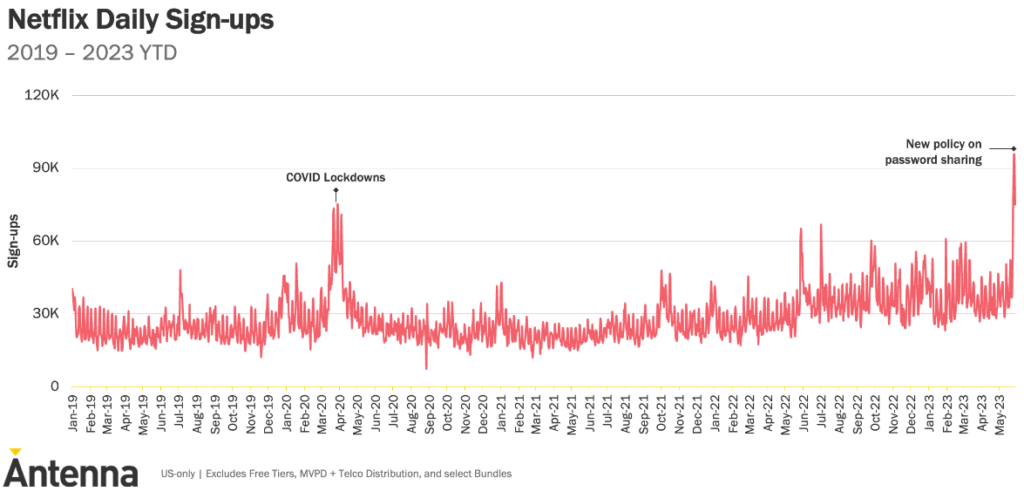Cracking the code: How Netflix is winning with new ad tiers and password rules
Friday 16 June 2023
Portfolio insights

The performance of Netflix has been impressive, with a 96% increase in its share price since October 2022 and a 151% increase since its low in June 2022. We previously discussed Netflix on Livewire with Hans Lee in October 2022 and January 2022 Netflix Q4 results were not a horror story. And we remain invested today.
Conviction in investment markets is often challenging to maintain, as sell-side analysts tend to abandon a company that reports bad news. This was the case with Netflix in 2022 when sell-side analysts rapidly reduced their estimates due to the company’s slowed subscriber growth. But as investors, we need to stay the course.
As the world’s leading streaming service, Netflix presents a unique advertising opportunity. With its global reach and highly engaged user base that spans all demographics, Netflix offers advertisers unprecedented access to targeted and personalised advertising. Through advanced algorithms and machine learning, Netflix’s deep understanding of user preferences enables highly tailored ad content. Additionally, its rich variety of content, including TV shows, movies and documentaries across numerous genres, provides an ideal platform for advertisers to reach specific target audiences.
While Netflix historically maintained an ad-free model, it is now actively pursuing this opportunity, and early indications from advertisers are positive as they leverage Netflix’s advanced data analytics and reach a diverse and captive audience on a global scale.
The ad-supported tier: a win-win for Netflix and consumers
There are two key reasons ad-supported tiers can be beneficial. Firstly, they create an accessible entry point for a wider range of consumers. An ad-supported tier is typically cheaper, bringing in customers who might not be able or willing to pay for a premium ad-free service. Secondly, they provide an additional revenue stream for the platform. While subscriptions constitute the main income source for most streaming services, advertising can supplement this, bolstering overall revenue. Once users are in the ecosystem, they might upgrade to an ad-free experience, enhancing the overall conversion rate.
Netflix elaborated on advertising in its latest Letter to Shareholders (April 2023):
“We are pleased with the current performance and trajectory of our per-member advertising economics. In the US for instance, our ads plan already has a total ARM (subscription + ads) greater than our standard plan. So this month we’ll upgrade the feature set of our ads plan to include 1080p versus 720p video quality and two concurrent streams in all 12 ads markets – starting with Canada and Spain today. We believe these enhancements will make our offering even more attractive to a broader set of consumers and further strengthen engagement for existing and new subscribers to the ads plan.”
Monetising password sharers: a new revenue stream
Management first disclosed its intentions on password-sharing in its Q1 2022 earnings call revealing it was testing ways to address password sharing, which it believed was impacting the business. We were encouraged by the possibility of monetising the password sharers, as we commented on Livewire:
“The other part which they touched on – they have 100 million subscribers sharing passwords at the moment. Coming up with a clear plan to take a small amount of money off these password sharers, and this comes at a very high margin. If they manage to take a couple of dollars from each of these subscribers, it’s a meaningful contribution to Netflix’s revenue growth. We know they will start to move on that in 2023, and it provides good momentum for the company.”
We discussed the benefit of this strategy to the operating margin as these new subscribers would be very profitable because they were already consuming the service. Despite the significant blowback received when they announced the crackdown, the unpopular move is working in the company’s favour.
A recent report by Antenna, a subscription analytics company, reveals Netflix’s decision to prevent password sharing outside households has led to a significant increase in new signups. In the two days following the policy’s rollout in the US, the number of new account signups on Netflix surpassed the highest record since Antenna started tracking subscriber data in 2019. This spike in signups even exceeded the pandemic spike in April and May of 2020.

The positive market reaction to the password-sharing crackdown and the new ad-supported tier has led many sell-side analysts to upgrade their estimates and expectations for subscriber growth. As shareholders, we are encouraged by the early result and happy to remain invested as this industry consolidates following a challenging period over the last 18 months.



